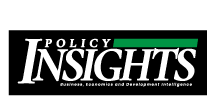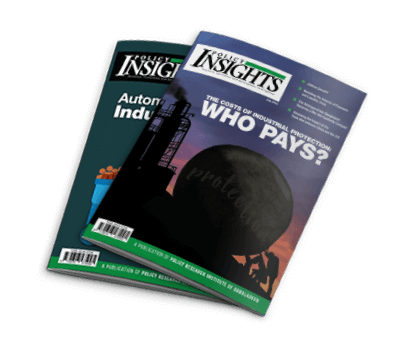Issue 10
October 2020
An article in this instalment of Policy Insights outlines foreign investment as a quintessential component of economic transformation and growth. FDI is recognized as a vehicle of technology transfer, facilitator of capacity building in human capital, stimulating domestic investment, bringing access to global markets and contributing to strengthening business institutions.
Another article attests to the importance of FDI for growth as experienced by countries such as Republic of Korea, China and Taiwan in their formative years. This would entail a multi-faceted approach by the government and the private sector to build a conducive system. This includes effective improvements in Doing Business indicators, the productivity index and the Logistic Performance index. Additionally, there is a need to make a few SEZs quickly operational to serve as models to demonstrate potential investors of an FDI friendly ecosystem.
This issue of Policy Insights includes an article which calls for greater emphasis on trade policy as an instrument for recovery in the post pandemic Bangladesh economy. This includes a trade facilitating stance for the import-export of Covid-19 mitigating products. It is argued that trade openness policy will help economic recovery against a backdrop of challenging global developments.
Changing population dynamics and the challenges Bangladesh faces are subject matters of another article. The worrying statistics of child marriage, contraceptive practices, and maternal mortality, widening gender gap in skills, and increasing elderly population coupled with development challenges in growth, employment, and urbanization cause a major threat of sustaining upward GDP growth momentum. These challenges are further intensified by the severity of fiscal constraint thereby needing urgent and prudent attention.
Another article in this issue highlights the import substituting backward linkage sector, where a dollar is saved, equivalent to a dollar earned in exports. Considered to be indirect exports, the primary textiles supplemented with garment accessories, are principle inputs of the apparel industry and can no longer be dismissed. It is predominantly an export-oriented sector and an import substitution par excellence.
Finally, this issue of Policy Insights contains an article which reiterates the critical need for reforms in taxation to meet the development needs of an upper-middle income country (UMIC). Bangladesh collects 8-9% of GDP as taxes whereas the global average is 20%. Income taxes in Bangladesh are just 2.6% of GDP compared to the UMIC average of 8%. Faced with the high public spending needs in education, social protection, agriculture and infrastructure, there is an urgent needs of quick reforms in the country’s primitive tax structure.


